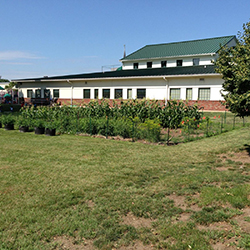
U of I Extension’s programs are aimed at making life healthier, safer and more profitable for individuals and their communities.
Visit the website of any nonprofit organization and click on “About Us.” Read the mission or vision statement, and you can’t help but catch the passion that drives everything they do.
Take Crittenton Centers—serving the Peoria area since 1892: To protect and nurture children and families. Educating and strengthening children and families to build safe, vibrant communities where children thrive and families succeed.
Or this—from Terra Brockman’s nonprofit organization, founded in 2001: The Land Connection trains farmers in resilient, restorative farming techniques; informs the public about the sources of our food and why that matters; and works to protect and enhance farmland so that we, and generations to come, will have clean air and water, fertile soil, and healthy, delicious food.
It’s not surprising that nonprofits like these reach out to the University of Illinois Extension to form partnerships and gain expertise to plan and execute educational programs that will make families and communities stronger.
Education in Nutrition
Like many nonprofits, Crittenton Centers has an army of volunteers and a small, full-time staff with big dreams. Its crisis nursery is open 24/7 every day of the year for child abuse and neglect emergencies and prevention. It encourages the families of children in their daycare—80 to 85 percent of which qualify for childcare subsidies—to take advantage of special educational classes. “We are trying to educate parents and teach them healthier ways to eat,” says Donna Ashley, Crittenton’s assistant program services director. “Extension is the known expert in this community, so that’s who we reach out to.”
Ashley says that last year, they wrote and received a collaborative grant with Extension to provide parent education classes in nutrition. “For many of our clients, it’s cheaper and easier to buy ready-made entrées,” she notes. “An Extension educator taught monthly cooking classes that would promote healthier eating.” As a part of the grant—and an incentive to attend—participating families were given something they used in each lesson’s recipe—a mixing bowl, a wooden spoon, a measuring cup or a recipe book—to help them prepare healthier meals at home.
“Without the knowledge and professional expertise from Extension personnel,” Ashley adds, “Crittenton wouldn’t be able to offer this kind of nutritional education to its clients.”
U of I Extension Educator Margaret Cover says they’ve partnered with Crittenton Centers for many years to help them in a variety of ways. About seven years ago, a U of I Extension master gardener worked alongside the staff and volunteers to design and implement its community garden program.
“We use a lot of volunteers to keep our community garden going, but the master gardener gave us the expertise at the beginning about what to plant and how to get it all started,” Ashley says. “And now, if we run into a pest issue or something, we know we can call on them for help.”
Helping New Farmers
Pests and weeds can be tricky to manage for organic farmers like Terra Brockman of The Land Connection. “Canada thistle is always a big problem,” she explains. “John Masiunas and Dan Anderson from U of I gave us some alternative farming techniques to fight it. They told us to till it, till it, till it. We also followed their recommendation to apply a special kind of vinegar.”
Brockman recalls one of her first encounters with U of I Extension Educator Deborah Cavanaugh-Grant. “I collaborated with Deborah on a field day to an organic beef farm. We were expecting 20 people, and over 120 showed up! We had to get additional hay racks to accommodate everyone, but Deborah was so organized and was able to handle all of those visitors on that field day.”
Cavanaugh-Grant is currently the local food systems and small farms educator with U of I Extension. She and Brockman have worked closely together, particularly during the first seven years of Central Illinois Farm Beginnings—a program that trains new farmers and those transitioning to organic/sustainable practices over the course of almost an entire year. It’s taught by established farmers, Extension personnel and other professionals, and includes a unique farmer-to-farmer mentorship.
“We couldn’t have gotten that program started without Deborah Cavanaugh-Grant and her tremendous organizational and grant-writing skills,” Brockman says. “She and I adapted the curriculum from a program in Minnesota to focus more on small-scale vegetable farms. It was a 100-percent collaborative effort.”
Brockman says that about three-fourths of graduates of the Farm Beginnings program actually pursue farming operations. Two of the program participants in the first year were Peoria County’s Kathy Corso and her daughter. Kathy helped develop a farmers market and has been very engaged in local foods, even educating doctors about nutrition.
More recently, Brockman has been working alongside Extension community and economic development educator Kathie Brown. “Our initial effort was to try to resurrect the Hanna City work camp—a 40-acre area that has been out of commission—into a food hub and incubator farm.”
Brockman adds that although their dreams for that land aren’t a reality yet, the collaboration resulted in a very positive Peoria Food Summit. “The summit has been a terrific coalition-building success that will have long-term significance by bringing lots of different people and agencies together.” iBi
Larson is a writer for the College of Agricultural, Consumer and Environmental Sciences at the University of Illinois. For more information about U of I Extension, visit extension.illinois.edu.

